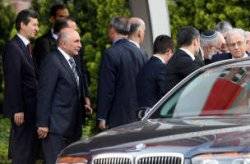Israeli and Turkish officials have made progress on compensation over a deadly 2010 Israeli raid on a Gaza-bound aid ship, and officials said they hoped a crucial step would be taken towards restoring once-solid ties between the two countries.
"This problem will be solved at a second meeting, and if not enough, at a third one," Deputy Prime Minister Bulent Arinc, who leads the Turkish team, told reporters after meeting the Israeli officials in Ankara on Monday.
"We both agree that this is a problem that needs to be swiftly resolved," he added.
If resolved, a major stumbling block to upgrading bilateral diplomatic ties would be overcome, Arinc said.
He however acknowledged that neither the timetable nor the venue for a second get-together was yet clear.
Al Jazeera's Hashem Ahelbarra, reporting from Ankara, said the purpose of the Israeli visit was to improve relations between the two countries and move forward.
"These are countries that have many things in common," Ahelbarra said. "They are pretty much concerned about the spillover in Syria, they have loads of regional issues. But to do that they have to convince the families of victims over the issue of compensation."
Ahelbarra added that the victims' families, however, want to bring those Israeli commanders responsible for the deaths to justice.
Restoring relations
Monday's meeting was the first stage of what Turkish officials have said would be a multi-step diplomatic process.
"A second meeting will take place within days, not weeks," said another Turkish negotiator, foreign ministry undersecretary Feridun Sinirlioglu.
"Today's meeting was positive ... We didn't discuss the amount of compensation but rather a general framework, parameters and principles," he added.
The Israeli Embassy in Ankara refused to comment on the closed-door talks, which saw Israeli officials visit their formerly strategic ally for the first time in almost three years.
The high-stakes negotiations follow a formal apology Israel made last month for the botched raid on May 31, 2010 in which its commandos killed nine Turkish activists on a Gaza-bound flotilla.
US President Barack Obama had pressed Israel to make the gesture to mend relations between two of Washington's key allies in the region.
Compensation and Ankara's demand for the removal of Israel's punishing restrictions on Gaza are the two sticking points in the talks.
Israel imposed its blockade on Gaza in 2006 after Palestinian fighters seized an Israeli soldier, who was eventually freed in 2011 in a trade for 1,000 Palestinian prisoners held by Israel.
The blockade was strengthened in 2007 - when the Hamas movement won elections in Gaza - then eased somewhat following an international outcry over the killing of the Turkish activists.
Arinc warned the final word on whether a deal would work rested with the families of those killed.
"It's a legal right for victims' families to demand compensation," said Arinc, adding that it would be up to them to accept a possible deal or go ahead with the court process.
"We, the government, will not take any action which will upset them," he assured.
But he urged the families to "trust the government" and avoid public statements which could lead to misunderstandings.
Observers point to the fact that the prime ministers of both Turkey and Israel are directly involved in the process as a cause for optimism.
Despite the compensation negotiations, however, pro-Palestinian activists in Turkey say they will not withdraw a lawsuit against four top Israeli military chiefs over the fatal 2010 raid. The next hearing in that case is scheduled for May 20.
PHOTO CAPTION
Members of an Israeli delegation arrive for talks with Turkish Deputy Prime Minister focused on compensation negotiations on April 22, 2013 in Ankara.
Aljazeera


 Home
Home Discover Islam
Discover Islam Quran Recitations
Quran Recitations Lectures
Lectures
 Fatwa
Fatwa Articles
Articles Fiqh
Fiqh E-Books
E-Books Boys & Girls
Boys & Girls  Articles
Articles










